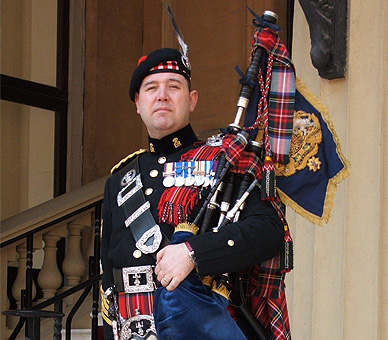| This Week’s Topic… | |

Best viewed in
|
Piper to the
Sovereign Queen Victoria took a trip, with her husband Albert, to Taymouth Castle in 1842 to visit the Marquis of Breadalbane and heard the famous bagpiper John Ban MacKenzie play. She was delighted. She sent a letter to her mother, the Duchess of Kent, exclaiming, "We have heard nothing but bagpipes since we have been to the beautiful Highlands and I have become so fond of it that I mean to have a piper." When asked for a recommendation, the Marquis suggested Angus MacKay as a piper for the Queen. Angus accepted the post and moved to London, England to become the first Piper to the Sovereign.
Duties Duties for Sovereign's Pipers—"Piobair na Bhan Righ"—were not limited to just piping. Official duties outlined in 1854 included serving as footman in the garden in the morning, waiting at dinner as needed, greeting visitors and escorting them to dinner and generally taking orders from the Sergeant Footman in general service around the household. Currently, the Sovereign's Piper's primary duty is to play Monday through Friday at 9 a.m. for about fifteen minutes under The Queen's window, a tradition that tourists appreciate! Regardless of inclement weather, he pipes every morning when Her Majesty is residing at Buckingham Palace, Windsor Castle, and the Palace of Holyroodhouse in Edinburgh or at Balmoral. (He usually takes his vacation when the Queen is at Sandringham in Norfolk.) He also plays for special events. The piper lives in the royal residence and travels with the Queen acting as a Page of the Presence, escorting the Queen to the various audiences. One unofficial rule is the piper cannot play the same tune twice for the morning performance the entire duration of the Queen's stay at Balmoral in the summer months. (The Queen likes fresh material!) At official state banquets, the Piper to the Sovereign is responsible for coordinating a dozen bagpipers who play in the dining room after the Heads of State have finished dinner. At Balmoral, Holyroodhouse, and Windsor he plays each evening at The Queen's dinner table.
Appointment and Duration of Duty Early on (Angus MacKay and William Ross), since this position was a lifetime appointment, another piper might unofficially take over duties of a Sovereign's Piper if he was unable to perform, but the title was usually held until death. This is no longer the case, as evidenced by James Campbell ending his service with retirement in 1910.These days, service is limited by the individual's remaining enlistment (maximum of twenty-two year term), so it will depend upon at which point in his term the individual is appointed. (For example, if appointed twelve years into enlistment this would leave a decade of service to the sovereign as piper.) It was decided in 1965 that appointments be removed from the Civil List and be made only from serving army pipe majors. Like a business, these pipers are interviewed by the Queen before she makes her appointment, and is based much on whether she feels their personalities are compatible as they will be interacting on regular basis.
Other Pipers Before Queen Victoria's death in 1901, it was common to have several pipers at the Queen's disposal. For instance, at one point James Campbell was 1st Piper and his nephew William Campbell was 2nd Piper. After her death, one piper was retained but it became the practice to employ several pipers at Balmoral as gamekeepers, deerstalkers or fishing gillies. These "extra" pipers would join the Sovereign's Piper in entertaining the king or queen. Two very famous such estate tenders/pipers were the "Bob's of Balmoral", Bob Brown and Bob Nicol. This practice continues to this day. In 1932, the Scots Guards granted a warrant as "Household Pipers to the Sovereign" and were required to provide a dozen pipers to perform at State Banquets. |
